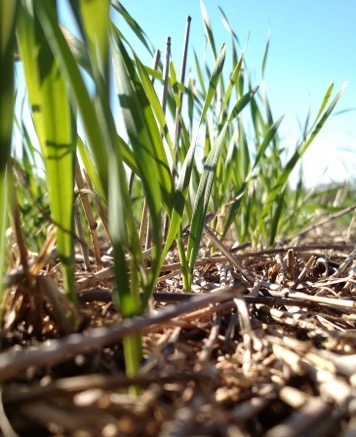Share This
Grains might be considered latecomers to the local foods movement, but they’ve arrived and they’re changing the way many communities think about flavor and flour. The local grain renaissance that’s making its mark, particularly throughout the Northeast and along the West Coast, is helping to connect consumers more closely with producers, millers, and artisan bakers.
Many of the farmers involved in local and specialty grain production are interested in growing something people can’t find on their grocery shelves, which has led to an expanding interest in heritage grain varieties. Perhaps one of the most significant benefits to these heirloom grains is flavor—what Dr. Stephen Jones at the Bread Lab calls the terroir of the grain. Instead of growing to maximize yield, farmers growing outside a commodity system can focus on growing varieties that produce much nuttier, sweeter, earthier flours than the all-purpose wheat flour we’re used to.
The full flavor of these grains is being explored and celebrated by bakers, chefs, and consumers alike, which is why it’s no surprise that whole grains are front-and-center in the local grains movement. Once you’ve committed to growing or purchasing heritage grains, it would be somewhat counter-intuitive then to refine and strip away the unique flavors of those carefully cultivated kernels. Beyond all the well-known health benefits that whole grains offer, their superior taste makes them hugely appealing—and heirloom grains, bred for flavor, take these culinary benefits of whole grains to the next level.
When we started learning about all the small-scale, local grain production happening in communities around the country, we decided to lend a hand by creating a hub of resources to help draw and strengthen the connections between consumers and the local or regional grain economies developing around them. We invite you to explore our Local Grains Map to find farmers and millers near you participating in this local grain renaissance.
GRAIN ECONOMY RESOURCES
Looking for more details about local grain projects, resources, and books? Here’s a list of many of our favorites:
- The Artisan Grain Collaborative — They are a network of farmers, millers, maltsters, bakers, chefs, food manufacturers, brewers, distillers, researchers, and advocates working together to promote a regenerative grainshed in the Midwest.
- The Bread Lab Plant Breeding Program at Washington State University — The Bread Lab researches wheat, barley, buckwheat, and other grains, identifying varieties that are especially well-suited in taste and flavor profile to applications in craft baking, cooking, malting, brewing, and distilling.
- The Colorado Grain Chain (Boulder, CO) and the UCCS Grain School (Colorado Springs, CO) are great resources for grain growers, millers, scientists and professionals — especially those in the Colorado area. They also host the UCCS Grain School, which offers both a college level academic course as well as open public forums about whole grain farming, whole grains and health, and the local grain community.
- The Common Grain Alliance — This group connects and supports farmers, millers, bakers, and grain artisans to build a vibrant, integrated, equitable, and regenerative grain economy in the Mid-Atlantic.
- The Greenhorns — This organization works to support and recruit new farmers and provide resources (films, radio, guidebooks, almanacs, anthologies, etc.) to teach sustainable agriculture, restorative land practices, and skill-building.
- Heritage Grain Trust (UK) — This organization works to encourage the production and use of heritage grains in the UK.
- Maine Grain Alliance — This group works to support the Maine grain economy through a seed restoration project and by hosting an annual Kneading Conference along with several other hands-on workshops throughout the year. They also award need-based technical assistance grants to help grain-based businesses in Maine.
- Meadows Mills in North Carolina — Meadows Mills is a manufacturer and supplier of mill stones and other milling parts and equipment.
- New American Stone Mills — This Vermont mill company is run by bakers and maintains a searchable map of where their mills are located around the world, which functions as a proxy for interest in fresh, locally-milled grains.
- Northern Grain Growers Association in Vermont — This organization includes growers, maltsters, bakers, and grain enthusiasts all working to promote locally grown grains.
- Tehachapi Heritage Grain Project in Southern California — The project aims to preserve and grow organic heritage grains which are naturally drought tolerant.
- USDA NRCS Plants Database — This national database allows users to search by crop or species and find where in the US it’s being grown. The database also provides descriptive information about the plant and its place of origin.
- USDA’s National Small Grains Collection — The NSGC is a genebank that collects grain germplasm from around the globe and distributes seed freely to scientists. Their collection includes strains of wheat, barley, oats, rice, rye, triticale, and a variety of wild relatives.
- Additionally, historic mills offer insight and perspective into the history of regional grain systems and can act as a resource for those interested in learning more.
- The Mill at Anselma, Chester Springs, PA
- The Old Mill of Guilford, Oak Ridge, NC
- The Plimoth Grist Mill, Plymouth, MA
Books:
- The Third Plate: Field Notes on the Future of Food by Dan Barber
- The New Bread Basket: How the New Crop of Grain Growers, Plant Breeders, Millers, Maltsters, Bakers, Brewers, and Local Food Activists Are Redefining Our Daily Loaf by Amy Halloran
- Small-Scale Grain Raising: An Organic Guide to Growing, Processing, and Using Nutritious Whole Grains for Home Gardeners and Local Farmers by Gene Logsdon
- Grain by Grain: A Quest to Revive Ancient Wheat, Rural Jobs, and Healthy Food by Bob Quinn and Liz Carlisle
- A Guide to Northeast Grains by Kristina Razon
- Restoring Heritage Grains: The Culture, Biodiversity, Resilience, and Cuisine of Ancient Wheats by Eli Rogosa
We’d love to hear from you and learn about the farms, mills, malthouses, and grain projects happening in your backyard. Email us and tell us about the local grains making it to your table! (Caroline)
To have our Oldways Whole Grains Council blog posts (and more whole grain bonus content!) delivered to your inbox, sign up for our monthly email newsletter, called Just Ask for Whole Grains.



Comments
Add a Comment